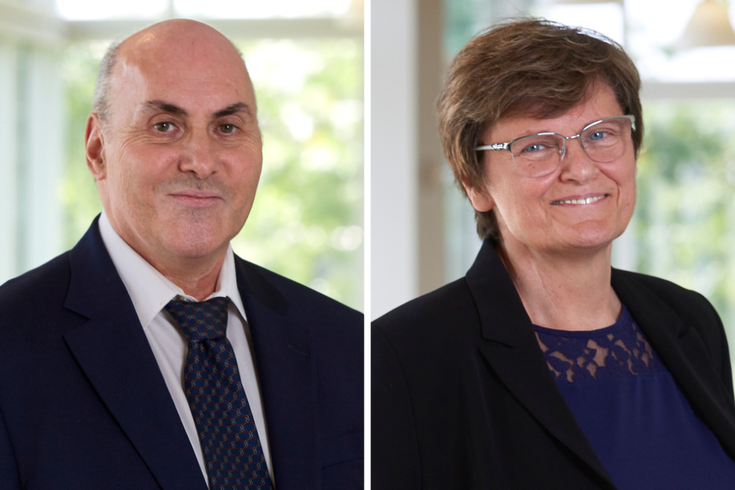
September 10, 2021
 Courtesy/Penn Medicine
Courtesy/Penn Medicine
Penn scientists Drew Weissman and Katalin Karikó won the 2022 Breakthrough Prize in Life Sciences for their roles in developing the modified mRNA technology used in the COVID-19 vaccines produced by Pfizer-BioNTech and Moderna.
Drew Weissman and Katalin Karikó, the University of Pennsylvania scientists whose landmark research helped develop the messenger RNA technology utilized in COVID-19 vaccines, have been awarded the 2022 Breakthrough Prize in Life Sciences.
The Breakthrough Prize is the world's largest in the field of science. Each of the five main prizes bestows $3 million to the winner or winners. In addition to the life sciences field, researchers in mathematics and fundamental physics are recognized each year, too.
Weissman is an infectious disease expert and professor of vaccine research at Penn's Perelman School of Medicine. Karikó is an adjunct professor of neurosurgery and a senior vice president at BioNTech.
The two scientists helped engineer modified mRNA technology used in the COVID-19 shots created by Pfizer-BioNTech and Moderna. The synthetic mRNA technology instructs cells to make copies of the coronavirus's spike protein, generating an immune response.
The two vaccines have been deployed across the globe to combat the ongoing public health crisis.
Karikó's path to scientific success was far from easy. She escaped Communist Hungary for the U.S. with her husband and daughter in the 1980s after she had been fired from her research position. But after arriving at Penn, Karikó struggled to obtain sufficient grant funding for her mRNA research and, at one point, even was demoted.
But the setback didn't stop Karikó from pushing forward with her research.
"I don't know if (Karikó) would be in the same position she is right now of having mRNA be a platform if she hadn't been demoted," Karikó's daughter, Olympic gold medalist rower Susan Francia said in a recent ESPN podcast recounting the family's triumphs.
Weissman and Karikó began investigating mRNA technology during the 1990s as a possible therapeutic to prevent infectious diseases.
At first, studies found that synthetic mRNA caused too much inflammation and was destroyed by the body's immune system before it could reach its intended targets. It was not safely and effectively producing strong immune responses.
The body was identifying one of the four molecular building blocks of synthetic mRNA, known as nucleosides, as an intruder. To fix this, the scientists altered the problematic nucleoside in a way that allowed synthetic mRNA to slip by the body's defense system.
In 2005, Weissman and Karikó published this research, demonstrating that mRNA technology could be modified to serve as a therapeutic for infectious diseases and effectively reach its intended targets.
Researchers are hopeful that mRNA technology may be used for future vaccines and treatments for pathogens such as malaria, HIV, cancer and influenza, as well as a wide range of coronaviruses. Earlier this week, BioNTech released data showing that an mRNA cocktail had suppressed colon cancer and melanoma tumors in mice — a promising development in the fight against cancer.
"The work of Drs. Weissman and Karikó is the scientific foundation on which these innovative and lifesaving vaccines rest," Perelman School of Medicine dean J. Larry Jameson said. "Their discovery of how to chemically modify mRNA to more effectively produce proteins in vivo laid the groundwork for the rapid development and deployment of mRNA vaccines — and has sparked a completely new way to look at prevention of infectious diseases and novel pathways for the treatment of cancer and other serious conditions."
Both scientists also recently have been honored with the Princess of Asturias Award and the Albany Medical Center Prize in Medicine and Biomedical Research.
Follow Pat & PhillyVoice on Twitter: @Pat_Ralph | @thePhillyVoice
Like us on Facebook: PhillyVoice
Add Pat's RSS feed to your feed reader
Have a news tip? Let us know.